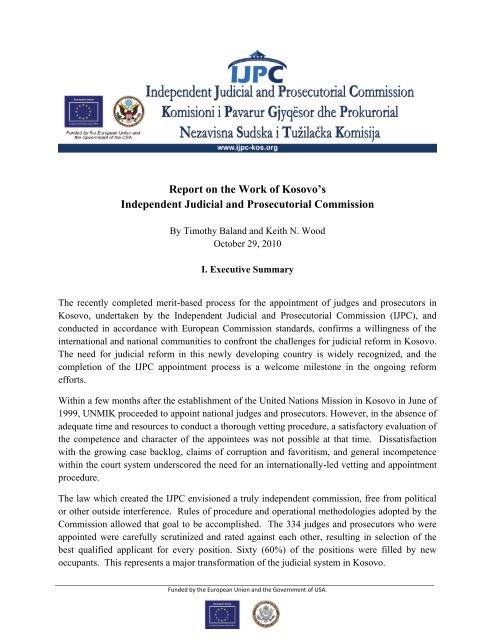Report on the Work of the IJPC
Report on the Work of the IJPC Report on the Work of the IJPC
TABLE OF CONTENTSI. Executive Summary...........................................................................................1II.III.IV.Introduction..........................................................................................................2Initial Developments.........................................................................................2Units within the Secretariat............................................................................5V. Methodology of evaluation, interview and recommendation..........7VI.VII.Phase I Activities and Developments.........................................................9Phase II Activities and Developments.....................................................11VIII. Phase III Activities and Developments...................................................14IX.Review Panel......................................................................................................16X. Some Noteworthy Projects Highlights.....................................................17XI.Concluding Observations...............................................................................21The IJPC and its Secretariat are funded by the Commission and the Government of the United States
- Page 1: Report on the Work
- Page 5 and 6: The MOU designated the United Natio
- Page 7 and 8: to preserve confidentiality; protec
- Page 9 and 10: In doing their work, JVU officers m
- Page 11 and 12: 95. Utilization of the Evaluation G
- Page 13 and 14: 11A. Announcement of Phase II Posit
- Page 15 and 16: Additional plenary sessions of the
- Page 17 and 18: 15C. New National CommissionersOcto
- Page 19 and 20: 17D. Phase III Requests for Reconsi
- Page 21 and 22: 1 MoC Pristina 15 8 2 02 MoC Feriza
- Page 23: 21XI. Concluding ObservationsThere
<str<strong>on</strong>g>Report</str<strong>on</strong>g> <strong>on</strong> <strong>the</strong> <strong>Work</strong> <strong>of</strong> Kosovo’sIndependent Judicial and Prosecutorial Commissi<strong>on</strong>By Timothy Baland and Keith N. WoodOctober 29, 2010I. Executive SummaryThe recently completed merit-based process for <strong>the</strong> appointment <strong>of</strong> judges and prosecutors inKosovo, undertaken by <strong>the</strong> Independent Judicial and Prosecutorial Commissi<strong>on</strong> (<strong>IJPC</strong>), andc<strong>on</strong>ducted in accordance with European Commissi<strong>on</strong> standards, c<strong>on</strong>firms a willingness <strong>of</strong> <strong>the</strong>internati<strong>on</strong>al and nati<strong>on</strong>al communities to c<strong>on</strong>fr<strong>on</strong>t <strong>the</strong> challenges for judicial reform in Kosovo.The need for judicial reform in this newly developing country is widely recognized, and <strong>the</strong>completi<strong>on</strong> <strong>of</strong> <strong>the</strong> <strong>IJPC</strong> appointment process is a welcome milest<strong>on</strong>e in <strong>the</strong> <strong>on</strong>going reformefforts.Within a few m<strong>on</strong>ths after <strong>the</strong> establishment <strong>of</strong> <strong>the</strong> United Nati<strong>on</strong>s Missi<strong>on</strong> in Kosovo in June <strong>of</strong>1999, UNMIK proceeded to appoint nati<strong>on</strong>al judges and prosecutors. However, in <strong>the</strong> absence <strong>of</strong>adequate time and resources to c<strong>on</strong>duct a thorough vetting procedure, a satisfactory evaluati<strong>on</strong> <strong>of</strong><strong>the</strong> competence and character <strong>of</strong> <strong>the</strong> appointees was not possible at that time. Dissatisfacti<strong>on</strong>with <strong>the</strong> growing case backlog, claims <strong>of</strong> corrupti<strong>on</strong> and favoritism, and general incompetencewithin <strong>the</strong> court system underscored <strong>the</strong> need for an internati<strong>on</strong>ally-led vetting and appointmentprocedure.The law which created <strong>the</strong> <strong>IJPC</strong> envisi<strong>on</strong>ed a truly independent commissi<strong>on</strong>, free from politicalor o<strong>the</strong>r outside interference. Rules <strong>of</strong> procedure and operati<strong>on</strong>al methodologies adopted by <strong>the</strong>Commissi<strong>on</strong> allowed that goal to be accomplished. The 334 judges and prosecutors who wereappointed were carefully scrutinized and rated against each o<strong>the</strong>r, resulting in selecti<strong>on</strong> <strong>of</strong> <strong>the</strong>best qualified applicant for every positi<strong>on</strong>. Sixty (60%) <strong>of</strong> <strong>the</strong> positi<strong>on</strong>s were filled by newoccupants. This represents a major transformati<strong>on</strong> <strong>of</strong> <strong>the</strong> judicial system in Kosovo.Funded by <strong>the</strong> European Uni<strong>on</strong> and <strong>the</strong> Government <strong>of</strong> USA.



